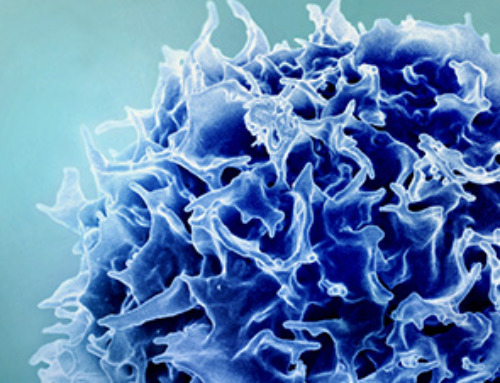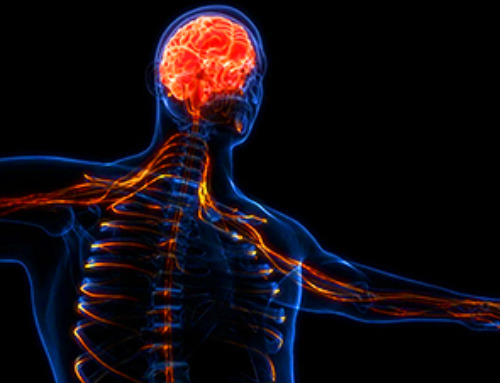The Linseman Laboratory is studying the long-term brain health effects of COVID-19 in individuals with and without traumatic brain injury (TBI). Preliminary data suggest that those with a history of both COVID-19 and TBI experience more severe long COVID symptoms. The study is also examining blood biomarkers to understand age-related differences in long COVID and explore potential treatments targeting neuroinflammatory pathways.
In January 2021, Ron Miller's life was upended. The then-39-year-old, who described his health at the time as perfectly fine, contracted COVID-19. Two years later, he's unable to work as he still suffers from extreme fatigue and brain fog—a byproduct of his battle with long COVID.
Ron's not alone. In fact, he's among the nearly 20% of people who've experienced lingering COVID-19 symptoms.
"It never really went away," he says.
Ron, whose name has been changed for this story, is part of the Linseman Laboratory's study on the long-term brain health effects of COVID-19 in people with and without traumatic brain injury (TBI).
The lab, which is run by University of Denver College of Natural Sciences and Mathematics professor Dan Linseman, is part of the Knoebel Institute for Healthy Aging. The lab's work focuses on neuroinflammation, neurodegeneration, neurotrauma and now long-neurological COVID.

Traumatic brain injury (TBI) is a form of brain damage resulting from a sudden external force or impact that disrupts the normal function of the brain. It can be caused by events such as falls, car accidents, sports injuries, or violence, and ranges in severity from mild concussions to severe brain damage. TBI may lead to temporary or permanent cognitive, physical, and emotional impairments, with symptoms including headaches, memory loss, difficulty concentrating, mood swings, and altered speech or motor functions. Treatment and recovery depend on the severity of the injury and may involve medical intervention, rehabilitation, and ongoing support.
Allison Grossberg, a fourth-year doctoral student in the cellular and molecular biology program, is leading the study, which began in 2022 and partners with National Jewish Health and Resilience Code. Grossberg and Linseman wanted to know whether individuals with a history of both brain trauma and COVID-19 have worsened long-term neurological and psychological symptoms, increased inflammation, or an increased risk of neurodegenerative disease and/or auto-immunity.
"Certain infections like COVID-19 and Lyme disease can lead to inflammation in the brain—so why should they be any different?" Grossberg says.
So far, the Linseman Lab has preliminary data for 48 of the study's participants, 28 of whom, like Ron, had COVID-19 and one or more TBIs; 11 had only a TBI; and five had only COVID. And four participants—the control group—had no history of COVID or TBI.
The study collects its data through a yearly visit in which participants complete a cognitive assessment and a detailed questionnaire and have blood drawn.
Linseman and Grossberg say it's possible the findings may change over the five-year study as more participants are recruited. But as of now, the preliminary data is clear: Those with a history of COVID-19 and TBI reported more severe long COVID symptoms, a higher symptom burden, and more frequent symptoms.
For many of the study's participants who have had a concussion, including Ron, it's been decades since their injury.
"Concussions you get when you are young can cause persistent underlying damage, and some of that damage is likely persistent neuroinflammation," Linseman says. "For example, we found that people who have Lyme disease have a certain cadre of neurological symptoms, but if they have a history of concussions, those symptoms are much worse. I think it's similar with COVID. These are all neurotropic, so they get into the brain. They cause inflammation. If they do that on a background of sustained persistent neuroinflammation like a history of head injury, it basically becomes a cumulative effect on the brain."
The study participants ranged in age from 18-83. Everyone who reported contracting COVID-19 had mild to moderate symptoms. Nasal congestion was the most reported, and chest pain and tightness were the most severe.
Those who reported having COVID-19 and TBI reported worse depressive symptoms, worse functional outcomes, and increased fatigue.
The study isn't only recording information through a unique detailed questionnaire. Grossberg and Linseman are also examining biomarkers from the blood samples of each participant. Every cell in the body secretes lipid vesicles, Grossberg says, which are used to communicate with other cells in the body.
"They're tagged with little markers that are specific to each cell type that releases them," Grossberg says. "Inside these little packages are tons of important signaling molecules that help us understand what's going on in someone's brain as opposed to just what's happening in the bloodstream."
Then researchers can take the vesicles, or exosomes, from each patient and incubate them with cells grown in the lab.
"We expect that the exosomes from participants with history of COVID and TBI carry cargo that might cause an inflammatory response in the cell that is worse compared to exosomes from healthy control participants," Grossberg says. "We expect it to look similar to the inflammatory response in cells exposed directly to a bacterial endotoxin, a lipopolysaccharide, which is known to cause inflammation," Grossberg says.
According to the preliminary data, exosomes from those who had a combined history of COVID-19 and TBI caused inflammation in the lab-grown astrocytes.
What's more, Linseman says, is the potential link between age and long COVID. When the study began, they anticipated that older people with a history of concussions would report the worst long COVID symptoms. So far in their findings, the opposite is true.
"That's leading me into supporting the theory with the immune system and neuroinflammation that's contributing to the symptomology," Linseman says. "The biggest difference between older and younger people is that younger people have a more robust immune system."
If their hypothesis is correct, and there's a neuroinflammatory pathway that's upended by COVID and TBI, researchers can start to explore potential treatments, like one that inhibits the inflammatory pathway.
While that discovery may be years in the making, the Linseman Lab's study is making strides in the right direction.
For Ron, a DU graduate who was a partner in a risk management consulting firm, participating in this study means something—a tangible way to make an impact.
"If it could be helpful to society overall, not necessarily just me, it would be nice. Who knows if it will keep others from getting it in the future," Ron says. "I have a lot of time on my hands, might as well use it to contribute some good."
News
This Viral RNA Structure Could Lead to a Universal Antiviral Drug
Researchers identify a shared RNA-protein interaction that could lead to broad-spectrum antiviral treatments for enteroviruses. A new study from the University of Maryland, Baltimore County (UMBC), published in Nature Communications, explains how enteroviruses begin reproducing [...]
New study suggests a way to rejuvenate the immune system
Stimulating the liver to produce some of the signals of the thymus can reverse age-related declines in T-cell populations and enhance response to vaccination. As people age, their immune system function declines. T cell [...]
Nerve Damage Can Disrupt Immunity Across the Entire Body
A single nerve injury can quietly reshape the immune system across the entire body. Preclinical research from McGill University suggests that nerve injuries may lead to long-lasting changes in the immune system, and these [...]
Fake Science Is Growing Faster Than Legitimate Research, New Study Warns
New research reveals organized networks linking paper mills, intermediaries, and compromised academic journals Organized scientific fraud is becoming increasingly common, ranging from fabricated research to the buying and selling of authorship and citations, according [...]
Scientists Unlock a New Way to Hear the Brain’s Hidden Language
Scientists can finally hear the brain’s quietest messages—unlocking the hidden code behind how neurons think, decide, and remember. Scientists have created a new protein that can capture the incoming chemical signals received by brain [...]
Does being infected or vaccinated first influence COVID-19 immunity?
A new study analyzing the immune response to COVID-19 in a Catalan cohort of health workers sheds light on an important question: does it matter whether a person was first infected or first vaccinated? [...]
We May Never Know if AI Is Conscious, Says Cambridge Philosopher
As claims about conscious AI grow louder, a Cambridge philosopher argues that we lack the evidence to know whether machines can truly be conscious, let alone morally significant. A philosopher at the University of [...]
AI Helped Scientists Stop a Virus With One Tiny Change
Using AI, researchers identified one tiny molecular interaction that viruses need to infect cells. Disrupting it stopped the virus before infection could begin. Washington State University scientists have uncovered a method to interfere with a key [...]
Deadly Hospital Fungus May Finally Have a Weakness
A deadly, drug-resistant hospital fungus may finally have a weakness—and scientists think they’ve found it. Researchers have identified a genetic process that could open the door to new treatments for a dangerous fungal infection [...]
Fever-Proof Bird Flu Variant Could Fuel the Next Pandemic
Bird flu viruses present a significant risk to humans because they can continue replicating at temperatures higher than a typical fever. Fever is one of the body’s main tools for slowing or stopping viral [...]
What could the future of nanoscience look like?
Society has a lot to thank for nanoscience. From improved health monitoring to reducing the size of electronics, scientists’ ability to delve deeper and better understand chemistry at the nanoscale has opened up numerous [...]
Scientists Melt Cancer’s Hidden “Power Hubs” and Stop Tumor Growth
Researchers discovered that in a rare kidney cancer, RNA builds droplet-like hubs that act as growth control centers inside tumor cells. By engineering a molecular switch to dissolve these hubs, they were able to halt cancer [...]
Platelet-inspired nanoparticles could improve treatment of inflammatory diseases
Scientists have developed platelet-inspired nanoparticles that deliver anti-inflammatory drugs directly to brain-computer interface implants, doubling their effectiveness. Scientists have found a way to improve the performance of brain-computer interface (BCI) electrodes by delivering anti-inflammatory drugs directly [...]
After 150 years, a new chapter in cancer therapy is finally beginning
For decades, researchers have been looking for ways to destroy cancer cells in a targeted manner without further weakening the body. But for many patients whose immune system is severely impaired by chemotherapy or radiation, [...]
Older chemical libraries show promise for fighting resistant strains of COVID-19 virus
SARS‑CoV‑2, the virus that causes COVID-19, continues to mutate, with some newer strains becoming less responsive to current antiviral treatments like Paxlovid. Now, University of California San Diego scientists and an international team of [...]
Lower doses of immunotherapy for skin cancer give better results, study suggests
According to a new study, lower doses of approved immunotherapy for malignant melanoma can give better results against tumors, while reducing side effects. This is reported by researchers at Karolinska Institutet in the Journal of the National [...]





















